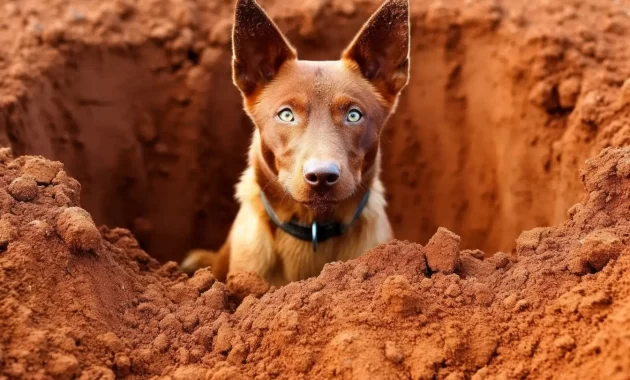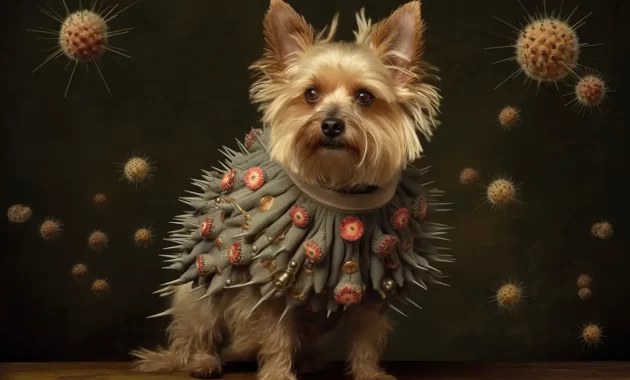
It’s a horrible sight to see your beloved dog pooping blood. You may wonder why this is happening and seek the answer to this challenging question. The good news is that you are not alone in facing this challenge.
Many pet owners ask the same question, and it is essential to understand what could be causing your dog’s issue and how to help them get better.
At its core, finding out why your dog is pooping blood requires understanding what type of medical condition they may have. This can be incredibly challenging when symptoms are not visible and require further investigation from a veterinarian.
Fortunately, with some knowledge about common causes for bloody stool in dogs, you can take steps towards helping your furry friend heal and feel better quickly.
Diet And Nutrition

The life of a pet is full of joy and adventure. But, when their daily routine is disturbed by health issues such as blood in their stool, it can cause concern.
Blood in the stool often indicates an underlying problem that needs to be addressed.
When it comes to diet and nutrition, there are several factors to consider when trying to identify the cause of your dog’s bloody stools.
First, it’s essential to evaluate your dog’s feeding habits.
Are they eating regular meals or snacking throughout the day?
Is there enough variety in their diet? Could they have access to food that isn’t meant for them?
These are all critical questions to ask to determine if any dietary changes could be causing this symptom.
Second, consider if your dog has any food allergies or sensitivities that may be playing a role.
If your dog is eating something they’re allergic to or sensitive to, it can cause inflammation in their digestive tract leading to bloody stools.
It is also possible that the food itself may contain ingredients that could irritate your dog’s gastrointestinal system and result in blood appearing in their feces.
Identifying the root cause of this issue starts with understanding what is going into your pet’s body and how it affects them.
To ensure your furry companion stays healthy and happy, analyze their diet and provide a balanced and nutritious meal plan free from potential allergens or irritants.
Infectious Diseases

Blood in a dog’s stool can be an alarming symptom for pet owners. It could be indicative of several different medical conditions, some potentially serious.
Infectious diseases can cause bloody diarrhea and should always be ruled out by a veterinarian with a thorough physical examination and appropriate blood tests. If the results come back positive, treatments may include antibiotics, fluid support, and in severe cases, blood transfusions.
While some infectious diseases are relatively easy to treat, others may require more intensive care and hospitalization. For example, parvovirus is a highly contagious disease that affects puppies and can result in bloody diarrhea.
In addition to aggressive supportive care such as intravenous fluids and antibiotics, dogs suffering from parvo may need multiple blood transfusions to replace red blood cells lost due to infection or other complications.
Pet owners need to recognize the symptoms of infectious diseases that can cause bloody stools so they can seek veterinary attention as soon as possible. Early diagnosis and treatment are vital to ensuring the best outcome for their beloved dog.
Many dogs will fully recover from these illnesses with prompt medical attention and appropriate care.
Parasites

Parasites are common causes of blood in the stool of dogs. The most common parasites include roundworms, hookworms, and whipworms.
Environmental factors can also cause intestinal parasites, as dogs acquire them when they come into contact with contaminated soil or feces.
| Parasite | Description |
|---|---|
| Roundworms | Long, thin worms that live in the intestines |
| Hookworms | Small, thin worms that attach to the intestines |
| Whipworms | Thin worms that live in the large intestine |
Dogs can also develop behavioural issues such as stress or anxiety, which could lead to an upset digestive system and blood in their stool.
These behavioural issues can be caused by various environmental factors such as changes in routine, new people or pets, loud noises, or sudden movements.
Identifying any environmental factors causing your dog’s behavioural issues is essential so you can help reduce their stress levels before it becomes a significant issue.
In summary, several potential causes for blood in your dog’s stool include parasites and environmental factors that affect their behaviour. Understanding these causes and taking the necessary steps to address them can help ensure your dog’s health and well-being.
Digestive Disorders

Digestive disorders can cause bloody stools in dogs and should not be ignored.
For instance, Fido, a seven-year-old Labrador Retriever recently brought to the veterinary clinic with his owner complaining of bloody diarrhea.
After an examination and some diagnostic tests, it was determined that Fido suffered from anal gland inflammation and liver disease.
Anal gland inflammation can occur due to infection or trauma and is characterized by swelling and pain.
This condition often leads to rectal bleeding caused by ruptured blood vessels in the rectum’s lining.
Additionally, liver disease can cause changes in how blood clots, leading to easy bleeding from any organ in the body.
This can lead to bloody stools due to bleeding from the large intestine or rectum caused by impaired clotting factors produced by an unhealthy liver.
These digestive disorders are usually treated with antibiotics and other medications, depending on the severity of the condition.
Surgery may also be necessary if significant organ or tissue damage is involved.
Owners must recognize these symptoms early and take their pets for proper diagnosis and treatment before further complications arise.
Non-Digestive Disorders

Transitioning from digestive disorders to non-digestive disorders, sometimes the cause of bloody stool can be attributed to a severe underlying medical problem.
These issues could include bladder and kidney stones, tumours, or other conditions that can be more difficult to diagnose.
In some cases, exercise intensity or stress levels may be factors in developing these conditions.
It is also possible for your dog’s bloody stools to be caused by anemia.
Anemia occurs when there are not enough red blood cells in the body, which can be due to various reasons, including parasites and nutrient deficiencies.
If your dog’s anemia is severe enough, their gums may appear pale and become lazy and weak.
Finally, it’s essential to consider any medications your dog might have been given recently, as they could also be causing the bloody stools. Certain antibiotics, such as sulfonamides, are known to cause gastrointestinal upset in dogs which can result in bloody stools.
If you recently gave your dog medication, then it’s essential to contact your veterinarian immediately so that they can help you decide if it should be discontinued or changed.
Frequently Asked Questions
What Are The Long-Term Effects Of Blood In My Dog’s Stool?
The long-term effects of blood in your dog’s stool can vary depending on the underlying cause but most commonly include dietary changes and potential clotting issues.
If your pup is pooping blood over a prolonged period, it’s essential to consult a veterinarian for an accurate diagnosis.
Your vet may recommend dietary changes to avoid gastrointestinal distress and initiate testing to confirm potential clotting issues.
If a clotting disorder is identified, your vet may prescribe medication or supplements to help balance the blood and prevent further complications.
What Should I Do If I Think My Dog Is Pooping Blood?
Taking immediate action is essential if you suspect your dog is pooping blood.
Not only can this be a sign of dietary changes or intestinal parasites, but it can also indicate other potential illnesses.
To adequately address the issue, take your pup to the vet for an examination and possible tests so a diagnosis can be made.
The vet may suggest dietary changes such as switching foods, adding supplements, and providing plenty of fluids to help flush out any parasites or undigested material that may have caused the blood in the stool.
In the meantime, keep a close eye on your pet’s behaviour and activity level to ensure they remain healthy and comfortable.
What Is The Most Common Cause Of Blood In My Dog’s Stool?
Blood in the stool can be a sign of several health issues, but one of the most common causes is an underlying medical condition or infection.
Blood diseases, such as hemangiosarcoma, are one possible cause, while intestinal parasites like giardia and roundworms can also be blamed.
If you suspect either of these things may cause your dog’s blood, you must immediately take them to a veterinarian for diagnosis and treatment.
How Long Does It Take For My Dog To Recover From Pooping Blood?
No pet owner wants to see their beloved pup suffer, and seeing your furry friend pass blood in their stool can be a worrying sign.
Thankfully, with the proper medical care, dietary changes and possibly even blood transfusions, your pup can fully recover within a few weeks.
To ensure that your pup is back to its usual self as soon as possible, it’s essential to seek out veterinary help as soon as you notice any signs of blood in the stool.
With proper treatment, your four-legged companion will return to wagging their tail and chasing balls in no time!
Is There Anything I Can Do To Prevent My Dog From Pooping Blood In The Future?
If your dog has been pooping blood, you may wonder if there’s anything you can do to prevent it from happening again.
The first step is to take your pup to the vet for a thorough exam and some blood tests to determine the underlying cause of their digestive issues.
Depending on the results, your vet may recommend dietary changes or other treatments that could help your furry friend stay healthy and prevent more issues from arising.
Additionally, regularly checking for parasites and keeping up with vaccinations can help ensure optimal health for your pup.
Conclusion
The sight of blood in your dog’s stool can be alarming, but with prompt veterinary attention, it is usually nothing to worry about. However, if left untreated, the consequences can be dire.
To avoid this, taking your dog for regular checkups and watching for any changes in their stool is essential. With proper care and a watchful eye, you can help ensure that your beloved pup never experiences the dramatic effects of pooping blood again.
It’s essential to remember that prevention is better than cure; if you spot any signs of blood in your pup’s stool, don’t delay in seeking medical attention.
A few moments of vigilance could save you from a world of worry – and a mountain of vet bills – down the line.




